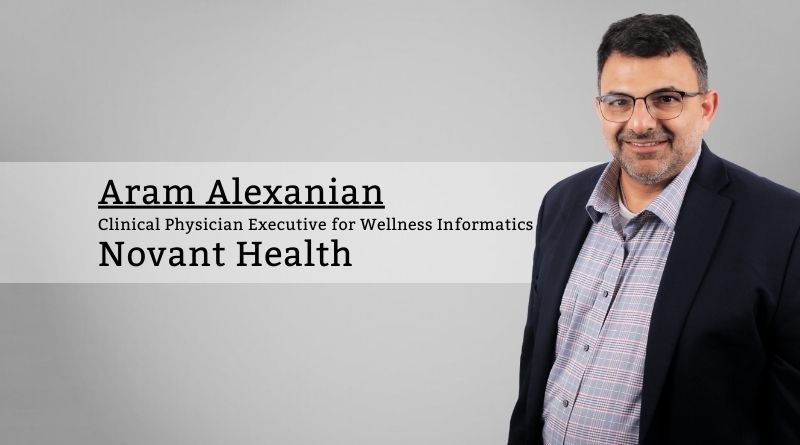Allow Your Clinicians to be Clinicians
By Aram Alexanian, Clinical physician executive for wellness informatics, Novant Health
EHR metadata provides useful objective metrics for assessing the impact of AI and automation on how physicians enter clinical notes and interact with patient records. However, from my perspective, leading a very gifted Wellness Informatics team that implemented an ambient AI transcription solution, a more meaningful measure of success comes directly from the lived experiences of the clinicians using it.
We are a clinical informatics team that prioritizes clinician wellness by living in the narrow yet very important intersection of technology and humanity. After thousands of interactions, our team has identified the main challenges that our physicians and APPs face. We also have corroborated our subjective findings with analytics tools offered by our EHR vendor to develop multiple avenues of personal, practice, and system-level support.
One of the ways we support our physicians and APPs is through direct observation. It gives us the privilege of being with our providers in the exam room with their patients. I remember thinking during one observation how marvelous a particular specialist physician was. Patients love this guy. He also has played a pivotal role in the health of a multitude of patients – including patients we shared.
I distinctly recall a 1:1 support session with him that made me realize we needed to take our advocacy and support to the next level. He confided that he wanted to leave the organization and possibly the profession. This doctor did not need to learn a new skill or technique. Instead, he needed to delegate some of his daily responsibilities to others. As we collected data, it became apparent that we needed a way to reduce our providers’ clinical documentation workloads.
Time previously spent writing notes can now be used for other complex tasks, such as addressing abnormal results.
We began in 2017 with in-person scribes. We still use the service today. The physicians who took advantage of it were extremely pleased. Job satisfaction improved and time available for other important tasks – such as in-basket management – increased. All combined, this decreased overall time in the EHR for these physicians. An unexpected benefit was the ability of these great physicians to mentor the next generation of practitioners. However, the cost of in-person scribes and staffing shortages precipitated by COVID-19 led us to look at AI-based options.
In 2020, we evaluated several vendors and selected one who provided AI transcription that was reviewed by a human before the final note was added to the physician’s preferred note template for review. Users felt that the service was hit-or-miss, with the quality of final note being highly dependent on the human reviewer. Most physicians who stayed with the service appreciated not having to worry about their documentation. Still, the inconsistent quality and cost were major drawbacks.
In 2022, we went live with a newer, fully automated version of the same company’s ambient AI transcription solution and we could not have been more pleased. Objective data show that the attrition rate is significantly lower than the version with human review, notes are delivered within seconds instead of hours, and any editing needed is much simpler and more efficient.
The subjective data obtained directly from the clinicians using the ambient AI solution is even more telling; participants have reported:
- Less burnout or fatigue.
- Reduced cognitive burden
- Better work/life balance
- Higher job satisfaction
- More likely to stay at their current organization
- More likely to remain in clinical practice
Specific comments from our physicians and APPs include:
- “Liberating! More time in the exam room where I can give the patient my undivided attention. I no longer feel like a well-paid data entry clerk!”
- “Much better documentation of historical data to support the level of visit.”
- “It might even give my career a few more years of longevity.”
- “Overall, very happy with this product. It has increased my job satisfaction and improved work-life balance.”
- “Wow! They documented things I would have forgotten.”
- “Very thankful for this service.”
- “I simply will not practice the rest of my career without some form of scribing, no matter the cost.”
- “I used to be working on labs from four to five days ago. Now, I work on yesterday’s labs.”
- “Another important part is that it allows me to look at my patients more and be more present to them during their appointments. I am no longer trying to partially complete notes in the room. The only things on the computer that I do in the room now are place orders or look up study results with the patients.”
As a user of ambient AI, I want to highlight the importance of reducing cognitive load. It feels very liberating to be able to concentrate on the patient and not have to stress about how to record what I am being told. Time previously spent writing notes can now be used for other complex tasks, such as addressing abnormal results.
Is this technology for everyone? No. Is it perfect? No. But it is incredibly good. Quite frankly, this technology is still in its early days and at its “worst.” However, the learning nature of AI means that it will continue to improve and evolve. We have noticed significant improvements since we first went live, including stylistic changes in how the AI transcribes the note.
The sky’s the limit as to what this technology will do for us as clinicians. It will queue orders as it hears them. Also, it will soon generate summaries of relevant facts about a patient’s health issues. There are many more advancements planned, and I can’t wait to see what’s to come.
I appreciate a technology that enhances my human abilities when I am with my patients in the exam room. Simply put, it feels great to feel like a clinician again.



